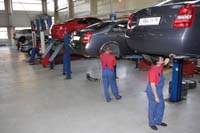Nissan chief executive tells shareholders that board members will forego bonus pay
Nissan Chief Executive Carlos Ghosn told shareholders Wednesday that the Japanese automaker's board members will forego their bonus pay to take responsibility for poor performance.

Ghosn acknowledged at a hall packed with more than 2,100 shareholders, a record attendance for Nissan, in Yokohama, south of Tokyo, that the company had not met its targets for fiscal 2006.
"We are taking our responsibility seriously," he said.
In the fiscal year ended March, Tokyo-based Nissan Motor Co. marked its first profit drop in seven years - the first time earnings have slid under the turnaround efforts led by Ghosn.
Ghosn tried to assure shareholders by saying that Nissan was investing aggressively in the future, including opening plants in emerging markets, introducing new models, developing green technology and building brand image.
"2007 will be a better year for Nissan," he said.
Nissan had marked a dramatic turnaround from near bankruptcy under the Brazilian-born Ghosn, who was sent in 1999 by French alliance partner Renault SA, which owns 44 percent of Nissan. But recently its sales have been sliding, and it has slipped into third place in Japan behind Toyota and Honda.
Most shareholders were quietly attentive, but a few aggressively questioned Ghosn, even heckling him from the floor at times. Such behavior is not particularly unusual at Japanese shareholders' meetings.
Grilled with questions about whether Nissan was falling behind in product quality and ecological technology, Ghosn told shareholders he was confident that better times were ahead, and that the problems were temporary.
One shareholder stood up and demanded Ghosn resign to take responsibility for failing to meet his own "commitments." Others said Nissan had fallen behind in quality surveys, didn't have stylish cars like Honda, and needed a better emblem design.
A key part of Ghosn's revival program at Nissan was to have the automaker at all levels from top management to the line worker set performance targets and then try to meet them.
Ghosn, also chief executive at Renault, has consistently met or outpaced his own targets - until recently. He told shareholders that Nissan has announced that it needs an extra year to meet its much publicized annual global sales target of 4.2 million vehicles, initially set for the fiscal year ending March 2009.
Kazuhiko Watanabe, a retired 62-year-old, said he was happy that the 200 shares he owns in Nissan have risen over the years.
"I'm hopeful," he said at a reception after the meeting. "But the emblem should be changed. It doesn't match the times."
Japan's No. 3 automaker, which makes Infiniti luxury models, Altima sedans and Z sportscars, has experienced faltering sales in important markets at a time when offerings from Toyota Motor Corp. and Honda Motor Co. are hot-sellers.
Higher raw material costs, incentives - discounts to woo buyers - and a lack of new models hurt Nissan's performance.
Ghosn acknowledged Nissan's finances had been so dire in the 1990s that it was not able to invest in technology.
Today, Nissan is investing heavily to play catch-up in key technologies, including hybrids powered by gas engines and electric motors to deliver good mileage, as well as other kinds of environmental innovations, he said.
For the just-ended fiscal year, Nissan's profit fell 11 percent to 460.8 billion yen ($3.9 billion), and the company sold 3.48 million vehicles worldwide, down 2.4 percent from the previous year.
Ghosn said efforts were under way to revive its business, including trimming jobs in Japan and the U.S., revamping dealerships and planning model rollouts.
Nissan expects profit will grow more than 4 percent to 480 billion yen ($4 billion) in the fiscal year through March 2008.
Nissan shares have lagged recently, was up 1.9 percent to 1,365 yen (US$11.06; euro8.25) as of the end of the morning session.
Subscribe to Pravda.Ru Telegram channel, Facebook, RSS!


